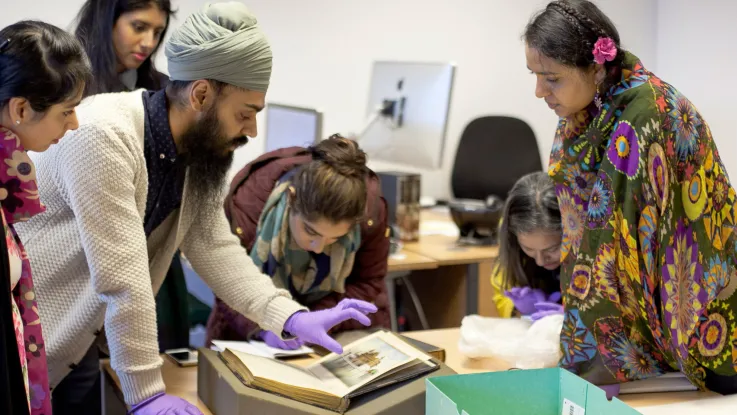Freedom of Information Policy
Introduction
The Freedom of Information Act (2000) gives general right of access to all types of recorded information held by public authorities. It came into force in January 2005, and the National Army Museum is named as a public authority under the Act. This legislation gives the public the opportunity to find out what the Museum does and how we do it, and makes it more accountable.
This policy covers how the Museum complies with the Act, responsibilities of staff, and related Museum policies.
Scope of the policy
This policy applies to all information created, received or held by staff in connection with their work at the Museum, regardless of format, storage medium and age.
The Museum will provide information when requested in compliance with the following legislation:
- The Freedom of Information Act (2000)
- The Environmental Information Regulations (2004)
- The Data Protection Act (2018) incorporating UK GDPR
- RoPSI Regulations (2015)
The Museum will manage its records in accordance with the Section 46 Code of Practice of the Freedom of Information Act, and the recommendations found in the Lord Chancellor’s Code of Practice on the management of records (2000).
Requirements
The Act places the following requirements on the Museum:
- Information which is routinely published by the Museum is made available in accordance with the Museum’s Publication Scheme.
- Information which is not covered by the Publication Scheme is made available to enquirers on request, within 20 working days, unless a valid exemption or limit applies.
- Exemptions under the Act and Regulations are applied appropriately
- Requests for information relating to the natural, historic or built environment are covered by the Environmental Information Regulations, and can be made verbally, receiving a response within 20 working days.
- A fair and efficient internal appeal system is administered.
- A properly structured approach to managing records is in place to ensure that essential records of the Museum’s activities are maintained.
Responsibilities
The Museum Director has legal responsibility for the Museum’s compliance with the Freedom of Information Act.
The Museum’s nominated Information Risk Officer is responsible for coordinating and monitoring information requests received by the Museum, monitoring and updating the Publication Scheme, and providing advice where necessary.
The Museum’s Senior Information Risk Officer (SIRO) has responsibility for leading internal reviews and making a decision in the case of an appeal; in the event that the SIRO was involved with the original response, the Assistant Director (Human Resources) will lead the review.
All staff have a responsibility to familiarise themselves with policies and procedures relating to the Act, to respond to requests for information in accordance to the Act, and to provide the Information Risk Officer with the necessary advice and assistance for the purpose of responding to requests for information.
Fees
When information is provided as copies of documents, photographs, film etc, the Museum reserves the right to charge the current fee for scans and reproductions. A fees notice will be sent to the enquirer prior to the supply of any information.
Where the costs of locating, retrieving and extracting information exceeds £450 (18 hours), the Museum reserves the right to charge for the additional costs in staff time. Costs are set at £25 per person per hour regardless of actual rate of pay.
How to make a Freedom of Information request
The Freedom of Information Act gives people a general right of access to all types of recorded information held by public authorities and imposes obligations on public authorities to disclose information, subject to a range of exemptions.
Anyone can make a request for information, although the request must be in writing.
The Act gives applicants two related rights:
- The right to be told whether the information exists
- The right to receive the information within 20 working days, where possible in the manner requested
Requests for information should be made to the Museum’s general information account - info@nam.ac.uk - and should provide as much detail as possible to enable staff to identify the information sought. Please do not send the same request to multiple Museum accounts or contacts as this may result in incorrect handling of the request.
Information about the National Army Museum already available
The Freedom of Information Act requires the Museum to publish a guide to the information that it makes available proactively, in the Museum’s Publication Scheme.
Further information, covering the Museum Council and Senior Leadership Team, recruitment and procurement are available on the Museum’s website in the About Us section.
Catalogue records to archival information held by the Museum, both in the Collection and Institutional Archive, can be searched respectively on the Museum’s online inventory and via the Archives Hub platform. This material is available to view by appointment by contacting info@nam.ac.uk
Information about the National Army Museum which is not already available
If the information required is not already available either through the Museum’s website or research service, a request for that information should be submitted to the Museum by email to info@nam.ac.uk or by letter to National Army Museum, Royal Hospital Road, London, SW3 4HT.
Some classes of information (such as personal data) may be exempt from disclosure under the terms of the Act. In these cases, the National Army Museum will explain the reasons for withholding the information to the applicant.
The National Army Museum does not have the resources to handle individual requests relating to procurement or commercial contracts, and any such requests received nominally under the Act will be managed under our usual enquiry procedure and may incur a research fee.
Complaints and appeals procedure
If you are not satisfied with the response you have had from the National Army Museum in respect of a request for information, you may seek an internal review of the decision from the Deputy Director of the Museum. Requests for internal review should be submitted in writing to Mike O’Connor - moconnor@nam.ac.uk - within two months of receiving the response to your original enquiry.
If you are not content with the outcome of the internal review, you have the right to apply directly to the Information Commissioner’s Office, Wycliffe House, Water Lane, Wilmslow, Cheshire, SK9 5AF.
Privacy notice
Our primary purpose for using your data is so that we can process your information request.
In addition, we use your data for the following secondary reasons:
- We record the types of applicant making requests to us by broad category for reporting purposes.
- If you are a journalist or from a media organisation, our Communications team will be notified that you have made a request so that they are aware of any potential forthcoming news coverage to which they may need to respond.
- We sometimes discuss requests that have been received with other public authorities (eg other national museums) to obtain advice. Although we never deliberately share the identity of applicants in these circumstances, if you have submitted the same request to a number of authorities, your identity may be obvious to those who have received the request.
Legal basis for processing
The legal basis for processing your request is article 6(1)C of the UK GDPR, which relates to processing necessary to comply with a legal obligation to which we are the subject.
If any of the details you provide in relation to your information request contains special category data, such as health, religious or ethnic information, the legal basis we rely on to process it is article 9(2)(g) of the UK GDPR, which also relates to our public task and the safeguarding of your fundamental rights.
What we do with it
When we receive a request from you, we will record the details of your request in our customer relationship management system. This normally includes your contact details and any other information you have given us. We will also store a copy of the information that falls within the scope of your request.
If you are a journalist or media organisation making a freedom of information or environmental information request, we will let our Communications team know that a request has been received from you and keep them informed of progress. This will not affect the information that you receive.
If you are making a request about information that we have received from another organisation, we will routinely consult the organisation concerned to seek their view on disclosure of the material.
We may compile and publish statistics showing information such as the number of requests we receive, but not in a form that identifies anyone.
How long we keep your data
Requests, and all personal data associated with them, made under Freedom of Information are in most cases destroyed two years after completion, in line with enquiries procedures set out in the Museum’s retention schedule. Responses to requests that have been challenged may be subject to a longer retention period.
What are your rights?
For more information on your rights, please see our main privacy policy.
Relationship with existing policies
This policy is supported by internal procedures available to staff on the Museum’s intranet, together with the following policies, which are available on the Museum’s website:
Further information
Further information about the Freedom of Information Act can be found from the website of the Information Commissioner and by writing to Wycliffe House, Water Lane, Wilmslow, Cheshire, SK9 5AF.
Policy approval and review
This policy was reviewed and approved by the Museum’s Information Asset Owners Group and Council in May 2023. It will be reviewed in five years, or earlier if there are any changes.



